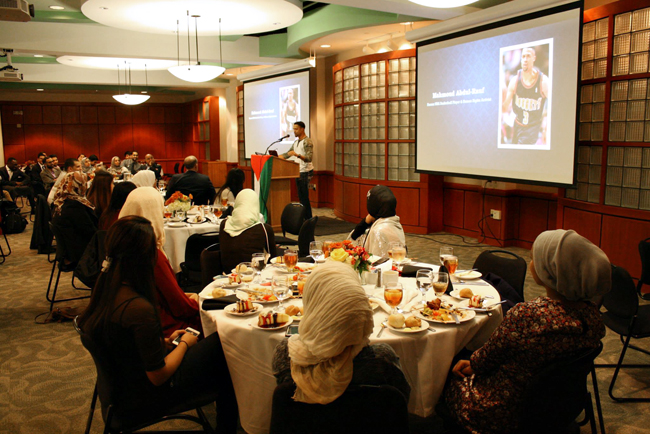On Nov. 7, the United Muslim Relief chapter at the University of Texas at Austin hosted its second annual Let Palestine Shine event, with Mahmoud Abdul-Rauf as its keynote speaker. Abdul-Rauf, previously known as Chris Jackson, is one of the greatest NBA players of all time, but you probably haven’t heard of him. Abdul-Rauf ended Michael Jordan and the Bulls’ 18-game winning streak in 1996 and scored 51 points on John Stockton.
Despite being diagnosed with Tourette syndrome, a neurological disorder that can create uncontrollable verbal and physical tics, Abdul-Rauf in his freshman year at LSU had a 30.2 point scoring average and an NCAA record, becoming SEC Player of the Year and only the second freshman All-Team American. His two years at LSU are arguably the best seasons in college basketball history; during his time in the NBA, had Abdul-Rauf shot 39 more free throws in the NBA, he would have surpassed Steve Nash as the most efficient free-throw shooter with a 90.5 percent success rate.
On the court and off, Abdul-Rauf was a leader. Abdul-Rauf protested Nike’s discrimination against his religion and when he was on the road for games he would tour the inner cities, “going from hood to hood to speak to men who had issues with fatherhood, incarceration and drug.” Before NBA Cares, the community-service-arm of the NBA, even existed, Abdul-Rauf had taken the initiative to help low-income communities, like the one he came from.
While Michael Jordan and John Stockton definitely remember his unyielding play, no one else does because of Abdul-Rauf’s patriotic stance for his belief. Abdul-Rauf refused to stand for "The Star-Spangled Banner," believing that it went against his Muslim faith.
If Abdul-Rauf had remained as Chris Jackson, a Christian, he would have been celebrated today for his moral integrity and allegiance to American values like the freedom of speech.
For us, the question isn’t whether the Pledge of Allegiance violates Islam. The more important question is, what does it mean to be American and patriotic?
At one point in American history, our courts legally defined being American as being white. In the opinion of these decisions, the judges would cite concern over the preservation of the American identity. This led to racist acts like the Chinese Exclusion Act of 1882. After our government had exploited cheap immigrant labor and found no other use for them, it decided that non-whites could not “assimilate.” Other examples of when society’s perceived American identity comes to a crossroads with reason and morality are the civil rights movement, women’s suffrage movement and the Red Scare. In all these examples, the tyranny of the majority was used to oppress people on the rationale that the specific group in question was not American or not American enough, and thus, did not have a claim to basic human rights.
I believe that nationalism is a cancer that only breeds enthnocentricism and ultimately conflict. Man-made borders and superiority complexes should give way to a unifying fraternity based on the human community. However, since being “American” is a reality, it is prudent that we abstain from defining our American identity as a checklist of being a white, Christian, beer-drinking, hot-dog-loving, football-watching male. Instead, our American identity should be based on our founding ideals of justice, equality and liberty.
When I am critical of police brutality in Ferguson, Mo., of President Barack Obama’s inhuman drone strikes or of the education system that has disproportionately failed the disadvantaged, I am practicing the purest form of patriotism. Our founding fathers distrusted government and preached accountability. America is not the Democratic or Republican Party; neither is America defined by the executive, judicial or legislative branches. Fundamentally, America is “We the people.” We the people are responsible for holding the government accountable to our ideals of justice, equality and liberty.
Whether we are white or Muslim-Arab, we must stand up for our beliefs. We will make mistakes, but collectively, over time, we will move toward a brighter future. So when Abdul-Rauf refused to stand up for the National Anthem it was only because he was too busy pledging his allegiance to our most fundamental principles. When Abdul-Rauf disrespected our symbolic flag it was because he was too busy respecting our principles.
Rizvi is a government senior from Dallas.





















